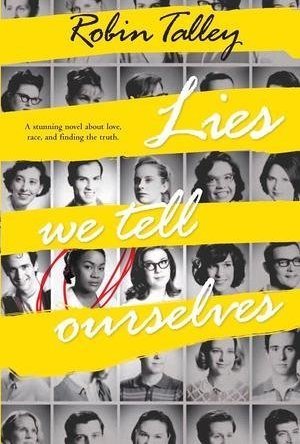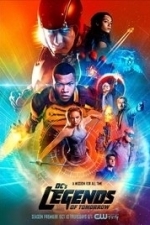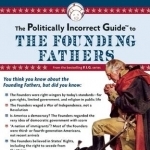
Lies We Tell Ourselves
Book
In 1959 Virginia, the lives of two girls on opposite sides of the battle for civil rights will be...

Varina
Book
In his powerful fourth novel, Charles Frazier returns to the time and place of Cold Mountain,...

How to Get Away With Murder - Season 2
TV Season Watch
Season 2 of this compelling, deceit-laced drama picks up just a week and a half after the end of the...

Within Arm's Length
Book
Dan Emmett was just eight years old when President John F. Kennedy was assassinated. The events...

DC'S Legends of Tomorrow - Season 1
TV Season Watch
As the world crumbles, the Time Master Rip Hunter (Arthur Darvill) takes matters into his own hands;...

DC's Legends Of Tomorrow
TV Show Watch
As the world crumbles, the Time Master Rip Hunter (Arthur Darvill) takes matters into his own hands;...

Bill Clinton: New Gilded Age President
Book
Of the original Gilded Age, historian Richard Hofstadter wrote: "There is no other period in the...

The Politically Incorrect Guide to the Founding Fathers
Book
The truth revealed--and PC myths shattered--about the Founding Fathers Tom Brokaw labeled the World...
Hazel (1853 KP) rated Lies We Tell Ourselves in Books
Dec 17, 2018
<i>Lies We Tell Ourselves</i> by Robin Talley is a realistic tale about the beginning of the integration of coloured people into white schools in late 1950s America. In Virginia it is 1959 and ten Negros are beginning their first day at Jefferson Highschool. The experience is narrated from one of the ten, Sarah’s, perspective. In other parts of the novel the voice changes to that of Linda, a particularly nasty white girl, who is one of countless students opposed to integration.
Although many young people will have been taught about the black civil right movement it is still shocking to read about the horrible things they had to endure. By writing in the first person, Talley encourages the reader to try to understand how they would feel in a similar situation. Sarah and her friends instantly become the victims of verbal and physical abuse that members of authority turn a blind eye to.
To Sarah, Linda is a nasty spoilt bully who, although does not join in with the taunting and abuse, is as bad as the rest of them. Through reading Linda’s account it becomes clear that her behaviour has a lot to do with her home life, in particularly with her father’s attitude towards her. After being forced to partner Sarah for a French project Linda begins to question why there is so much emphasis on skin colour, however not wanting to be shunned by her own friends she keeps these thoughts to herself.
Sarah is also struggling to come to terms with her sexual preference for girls. It has been drilled into her that these thoughts are a sin. She hides her true feelings from everyone and constantly berates herself mentally for being “unnatural”. But it turns out she may not be the only one with these thoughts.
The lies referred to in the title are not the blatant or harmful lies but rather the lies the characters believe or even want to believe. Each chapter begins with a lie that reflects what is occurring in the novel at that time; for example “There’s no need to be afraid” and “I don’t care what they think of me.” This is an interesting way of telling the story as it emphasizes Sarah’s determination to keep going despite what she is subjected to. It also reveals the mental struggles she faces. On the other hand the lies disclose Linda’s conflicting feelings towards the South’s current situation and segregation laws.
Although not a religious novel, each part begins with the title of a Christian hymn. It was the norm for everyone to go to church and, despite the separate churches, was something black and white people did. Sarah and Linda have faith in God yet they both use the bible’s teachings for opposing arguments. The religious aspect also highlights Sarah’s self-hatred and belief that she has fallen into sin.
Unfortunately in today’s world there are still issues with racism and homophobia however after reading <i>Lies We Tell Ourselves</i> it is evident that these situations have vastly improved, at least in the Western world, since the 1950s. Without children such as Sarah going through these horrible experiences nothing would have changed. There would still be separate schools, slavery and inaccurate opinions about race inequality. America has a lot to thank these brave students who were the first to create mixed race schools.
Overall this is a brilliant book. Well written and realistic, it really draws the reader in to the characters’ stories. Although <i>Lies We Tell Ourselves</i> is a work of fiction, it is historically accurate and can teach a lot about America’s history to young adults today.
Kristy H (1252 KP) rated Small Great Things in Books
Feb 1, 2018
This is a touching and powerful novel. Told from the varying points of view of Ruth, Kennedy, and Turk--baby Davis' father-- it is a compelling look at how race and family history shapes the person we become. It is a poignant story at points: it is amazing what people can rationalize when it comes to hatred. I found the novel very fitting right now, with what's going on in the U.S. Honestly, it's very frightening at times and hits a little too close to home.
Picoult's characters are well-formed and dynamic, and you find yourself drawn into parts of each.
Turk, obviously, despite the loss of his child, is not a sympathetic character, but he is a complex one; his progression over the course of the novel is intriguing, and it's amazing how Picoult did not make him a one dimensional white supremacist. The book is extremely well-researched; both from the side of white supremacy, as well as racism and the medical aspects of Davis' case. Kennedy is likeable and her struggle with Ruth's case, as she realizes the depth of both the visible and latent racism her client faces on a daily basis, is real and relatable. I applaud Picoult for tackling such a difficult subject with such honesty. It's almost as if, through Kennedy, she's admitting exactly what she doesn't know. (I highly recommend reading Picoult's afterword, as well.)
For me, the hardest parts of the book was that it gets a little too poetic in the Jodi Picoult way (those who frequently read her novels will identify), with her waxing on about race and parents and being brought together, versus letting the story tell itself. At points the book just goes on and on a bit, versus getting to the story and the point. There are lots of little subplots that go off, detracting at times from the main story and frustrating the reader. And, of course, there are some weird twists and plot points in the typical Picoult style, though they don't seem to pack the punch of her older novels. It all wraps up a little too smoothly, though I have to confess I sort of enjoyed the ending. It may have been a bit trite, but I am often a sucker for such things.
Overall, I was impressed with how Picoult approached this novel, and I enjoyed the storyline for the most part (I was certainly invested), though it dawdled at times and ended a bit too easily. I'd rate this a strong 3.5 - 3.75 stars. Certainly worth reading, especially if you're a Picoult fan.
I received a copy of this novel from the publisher and Netgalley; is available everywhere as of 10/11/2016.
